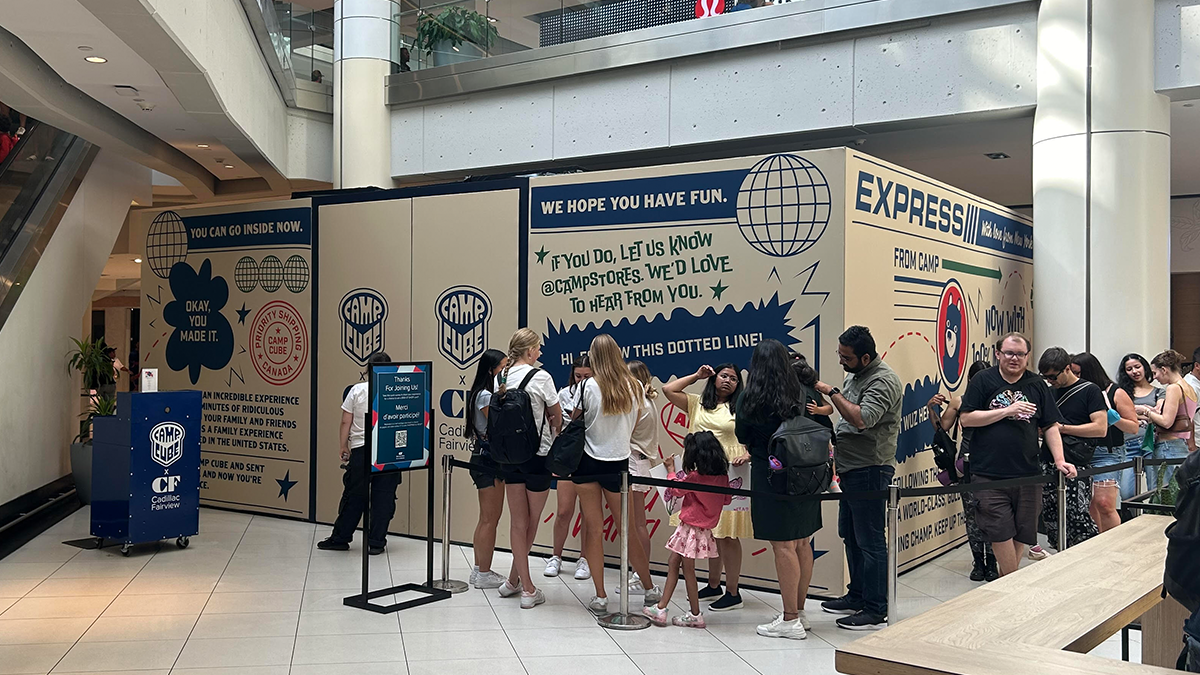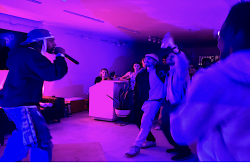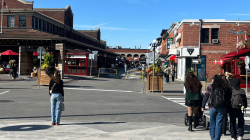In mid-August, a large, mysterious cube appeared inside the Rideau Centre. Located next to Bento Sushi and tucked underneath an escalator, it attracted a line of curious mall-goers. Some had seen it on Instagram; others had not.
Turns out the Cadillac Fairview (CF) CAMP Cube is a futuristic marketing tool that provides shoppers with a sci-fi gameshow experience. It will disappear Sept. 30.
After waiting in line, people enter the cube where they are surrounded by screens and a robot character who tells them they must save Earth from destruction by answering questions on wildlife and nature.
Interactivity is the name of the game, with participants engaging with the robot avatar. At the end of the game, participants get a $5 gift card for any store in the mall, which encourages shoppers to spend more money and time in the mall … and return another day for more.
“I saw the cube a few weeks ago and it seemed pretty cool and I thought I would try it out but now I just come for the free $5,” said Kevin Adams, who was back for his second run at the game.
“We’ve been here four days a week since the start of September. We basically just collect the gift cards. We use them to go eat, or buy stuff in the mall,” said Ryan Beardall.
“We were here just to shop and then I saw the cube. I saw it on Instagram and I was like, it’s here, may as well go see it,” said Taydan Brown, who was shopping with friends when they came across the CAMP Cube.
Those who already knew about the CAMP Cube before their visit, often found out about it from Instagram posts made by Ottawa-based influencers.
Other than the events page of the Rideau Centre, Instagram was the only platform CF and CAMP used to advertise the event.
A lot of shopping is done online today so to encourage in-person visits, direct experiences are important, says Aron Darmody, a marketing professor at Carleton University. “Your sharing of the experience is designed and encouraged across social platforms.”
The CAMP Cube is an example of a business marketing trend of providing free experiences for customers. According to the Harvard Business Review, 40 per cent of business executives say that they’ll spend more money on such events in the upcoming year.
“Events are definitely more popular,” says Darmody. “Now you have to offer more than what was presented to previous generations in terms of enticing consumers into physical retail spaces that are not just in a purely online way.”
Events like this one, or MilkUP’s post to pay events in Ottawa and Toronto for the past three years, entice people with their free entry. The post each person makes on social media upon entry spreads the word about the event.
Experiential marketing can be more than a pop-up experience. CAMP, the collaborators on the Cube, say they provide a “family experience.”
CAMP hosts on-location events in stores for children to enjoy based on storylines from shows and movies such as Bluey, Encanto and The Little Mermaid. CAMP’s collaborations with Disney make sense as the studio has been geared towards creating experiences for customers for decades.
“Something like Disneyland, it’s a whole series of performances the marketers created. It is the ultimate commercial stage,” said Darmody, who cited the company as a leading example of the experiential marketing approach.
“A lot of the time, as consumers we’re looking for moments of entertainment. So if its offered by marketers it’s what we gravitate towards.” Says Darmody.




